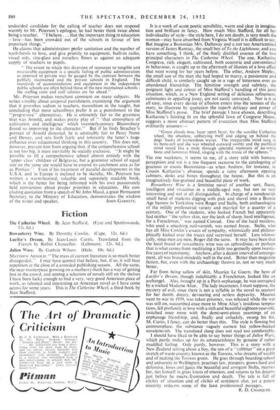Fiction
Rowanberry Wine. By Dorothy Cowlin. (Cape. 12s. 6d.) Julien Ware. By Guthrie Wilson. (Hale. 10s. 6d.) MATTHEW ARNOLD: "The mass of current literature is so much better disregarded." I may have quoted that before, but, if so, it will bear repetition at the close of a crowded publishing season. All the same, the near-masterpiece growing on a mulberry-bush has a way of getting lost in the crowd, and among a selection of novels still on the shelves I have been lucky enough to find a very, very good American piece of work, as talented and interesting an American novel as I have come across for some years. This is The Catherine Wheel, a third book by Jean Stafford.
"Green clouds''rose, layer upon layer, for the sun-like Catherine wheel, the absolute, unburying itself and edging up behind the dogs' backs of tremendous waves. The inseparable mind sang in its bone-cell and she was wheeled outward swiftly and the purblind mind nosed like a mole through splendid mansions of ice-white bone and luminous blood, singing with the music of the spheres."
The one weakness, it seems to me, of a story told with humane perception and wit is a too frequent recourse to the cataloguing of gracious or exotic Bostoniana—as when Andrew, for instance, in Cousin Katharine's absence, spends a rainy afternoon opening cabinets, desks and boxes throughout the house. But this • is an imaginatively fine-grained and beautiful piece of work.
Rowanberry Wine is a feminine novel of another sort, fluent, intelligent and vivacious in a middle-aged way, but not so very interesting and not at all distinguished. In charge of a nondescript small band of students digging with pick and shovel into a Bronze Age barrow in Yorkshire were Roger and Stella, both archaeologists of the mildly professorial variety and married for a quarter of a century. One of the students, who looked French but apparently had neither "the sallow skin, nor the look of sharp, hard intelligence, for a Frenchman," was named Conrad. One of the local maidens, who used a smashing nail-varnish, was named Joyce. Stella, who has all Miss Cowlin's excess of sympathy, whimsically and philoso- phically kicked over the traces and surprised herself. Less whimsi- cally, since men are men, Roger did the same. It may have been that the local brand of rowanberry wine was an aphrodisiac, or perhaps that is what comes from meditating a little too genteelly upon twenty- five years of matrimony. Anyhow, after a decent interval of estrange- ment, all was broad-mindedly well in the end. Better than magazine fiction, but, even with the archaeology thrown in, not so very much better.
Far from being sallow of skin, Maurice Le Guern, the hero of Lucifer's Dream, though indubitably a Frenchman, looked like an archangel. Alas, brought up in a Paris orphanage, he was corrupted by a wicked Madame Alice. The lady incarnates, I must suppose, the mystery of evil, since there is not a syllable in the novel to account for her dumb, dreary, devouring and sexless depravity. Maurice went to war in 1939, was taken prisoner, was released While the war was still on, succumbed once more to Mme Alice's insidious tempta- tions, fell profanely in love with a rich and beautiful eighteen-year-old, twitched once • more with the demi-semi-pious yearnings of an orphanage friendship, and, finally and unluckily, swung his fist. M. Curtis, I fancy, can do better than this. The style is flowing but commonplace, the substance vaguely earnest' but yellow-backed novelette-ish. The translated slang does not read too comfortably.
I should have liked to be able to say better things of Julien Ware, which partly makes up for its amateurishness by genuine if rather muddled feeling. Only partly, however. This is a story with a New Zealand setting about a boy, the son of a "rabbiter" on a great stretch of waste country,known as the Torrens, who dreams of wealth and of making the Torrens green. He goes through boarding-school and university in Wellington, practises law, prospers, grows hard and defensive, loves and jiates the beautiful and arrogant Stella, marries her, ties himself in great knots of emotion, and returns to his dreams just before he meets, frustration and death. The tale is full of clichés of situation and of clichés of sentiment also, yet a patent sincerity redeems some of the least professional passages. It is a work of acute poetic sensibility, warm and clear in imagina- tion and brilliant in fancy. How much Miss Stafford, for all her individuality of style—the style here, I do not doubt, is very much the woman—may have absorbed from Virginia Woolf it is difficult to say. But imagine a Bostonian Mrs. Dalloway and a not too Americanised version of James Ramsay, the small boy of To the Lighthouse, and you have something, 1 think, of the finely distilled essence of the two principal characters in The Catherine Wheel. The one, Katharine Congreve, rich, elegant, cultivated, both eccentric and conventional in behaviour, is caught up in the aftermath of illusion of a love affair that went wrong for her years before. The other, Andrew Shipley, the small son of the man she had hoped to marry, a passionate and difficult child, is similarly caught up in a rage of bitterness over an abandoned friendship. The feminine strength and subtlety, the poignant light and colour of Miss Stafford's handling of this joint situation, which, in a New England setting of delicious refinement, culminates in appalling irony, are not easily conveyed. Nor is it at all easy, since every device of allusion enters into the tension of the story, to illustrate by quotation the superb delicacy and power of Miss Stafford's prose. The brief passage I have ehosen, describing Katharine's fainting fit on the splendid lawn of Congreve House, suggests a more abstract pattern of evocation than Miss Stafford ordinarily assumes:— R. D. CHARQUES.


























 Previous page
Previous page